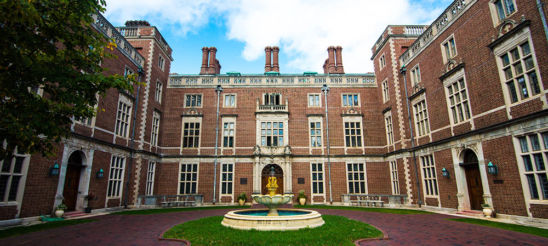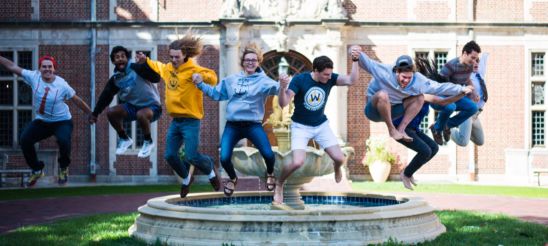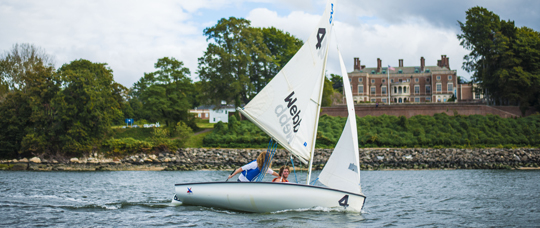Webb Recognized by Princeton Review as #15 Best Career Services, Ranks High in Additional Categories
Webb Institute is ranked in The Princeton Review’s latest edition of its college guide, The Best 384 Colleges, including being named #15 Best Career Services.
Webb was also received honors in the following ranking lists:
#5 Students Study the Most
#8 Most Accessible Professors
#20 Their Students Love These Colleges
Webb also received high marks in other areas, including 96 in Academics and 96 in Quality of Life according to The Princeton Review survey that asked students to rate their schools on dozens of topics and report their experiences.
A student surveyed for the guide boasted about Webb’s career services and premier internship program, “Work terms give each student a feel for industry sectors and allow them to make improved career decisions when selecting a first job – You’ll learn something in the classroom and then see it in action.”
One student said, “Professors are brilliant and since they all have practical work experience they are able to make our education applicable to what we’ll be doing once we graduate.”
“Students become best friends very quickly, giving everyone a great support system both academically and socially,” said another student noted.
One of The Princeton Review’s most popular guides, The Best 384 Colleges rankings are based on surveys of 138,000 students at 384 top colleges that includes a wide representation by region, size, selectivity, and character. Published annually since 1992, the book includes detailed profiles of the colleges with rating scores in 8 categories as well as ranking lists of top 20 schools in 62 categories.
For more information on the rankings and methodology visit www.princetonreview.com/college-rankings/how-it-works
Robert David Lion Gardiner Foundation Grant to Fund Need-Based Scholarships for Webb Students
by R. Keith Michel
President, Webb Institute
When William Webb established Webb’s Academy, his intent was to provide an education free of all costs to qualified applicants whose families could not otherwise afford the cost of an education. In the 1960’s, Webb faced compelling economic challenges that drove us to begin charging room and board. Today, room and board and others costs of attendance over and above our full-tuition scholarship run about $16,500 per year. We have found that the cost of attendance is inhibiting our ability to recruit the diverse group of economically disadvantaged high school students. In recent years, some Webb students have accumulated debt of $40,000 to $60,000 during their four years at Webb. Although all our students secure good jobs when they graduate and successfully pay back their federal student loans, we would like to reduce the debt load they face as they start their professional lives.
We are very pleased to announce that the Long Island-based Gardiner Foundation has awarded Webb a grant of $250,000. This grant will enable Webb to meet the “demonstrated need” of our students for the next three years. Webb will make the best effort to solicit contributions to endow room & board scholarships so this scholarship program can continue after the third year.
“Demonstrated Need” is a term that describes the cost for a student to attend college in excess of their “Expected Family Contribution” (EFC). The EFC is computed by the federal government when students file an application (FAFSA) seeking federal loans, and is primarily a function of family income, family assets, and the number of family members attending college. We believe all students and their family should make a contribution to their education at Webb, regardless of financial status. Therefore, we have established an expected minimum contribution of between $3,000 and $5,000 which may be covered by Subsidized federal loans if the student so chooses. The generous grant from the Gardiner Foundation provides sufficient funds to enable Webb to meet all need in excess of this minimum expected contribution. Thus, no Webb should graduate with excessive debt. With this program, Webb joins a list of approximately 70 colleges and universities in the United States that meet the demonstrated need of their students.
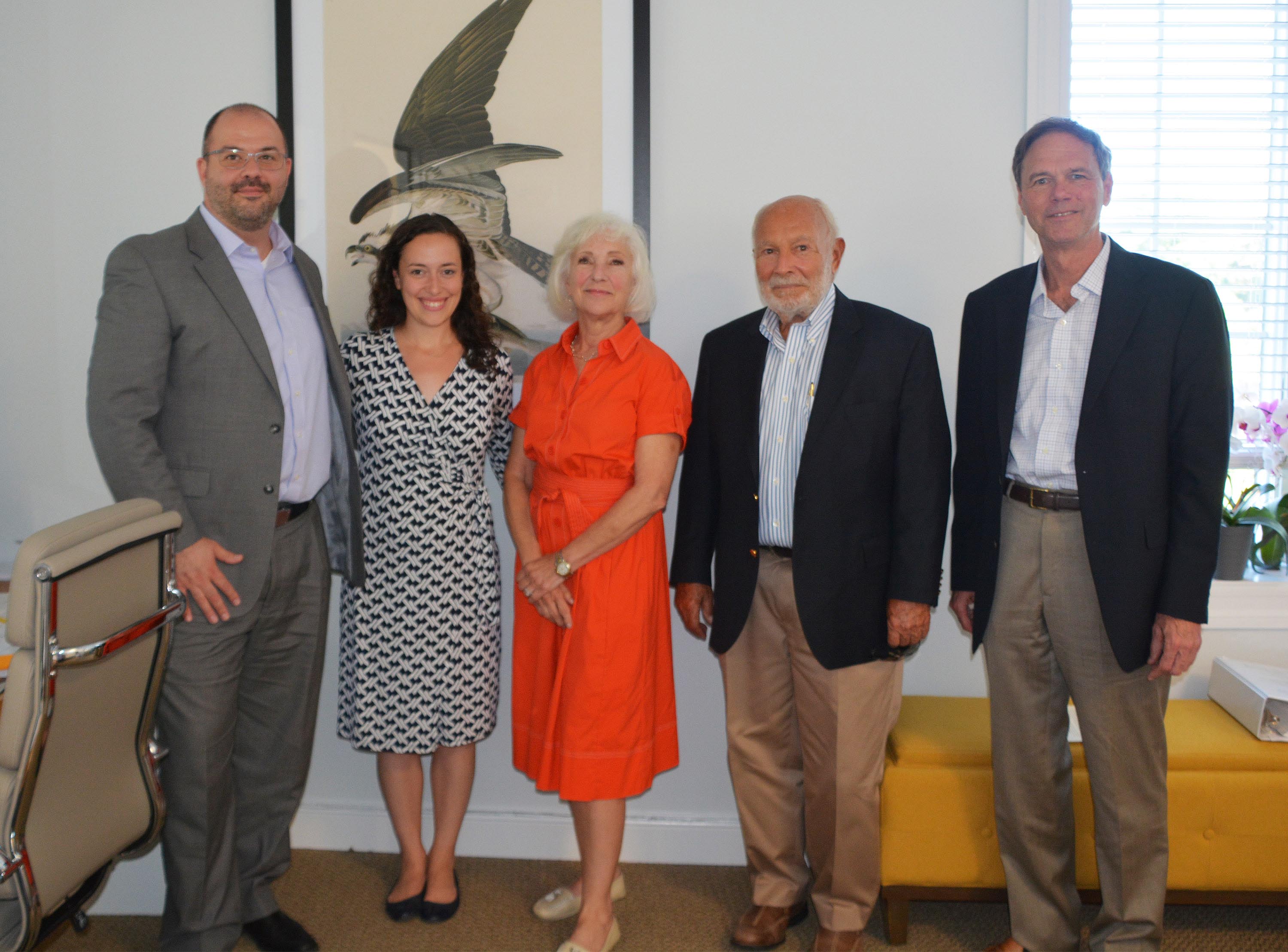
(From left to right) Webb Institute Director of Development, Anthony Zic, Director of Admissions and Student Affairs, Lauren Carballo, Executive Director of RDLG Foundation, Kathryn Curran, Webb Board of Trustee, Joseph Cuneo, and President R. Keith Michel. Photo Credit: Robert David Lion Gardiner (RDLG) Foundation
Webb Institute is featured on CNBC!
At this college, every student gets a full-tuition scholarship and a job
- Webb Institute is one of only nine colleges in the country that is completely tuition-free.
- Students there must commit to an intense focus on naval architecture and marine engineering and cover other expenses besides tuition.
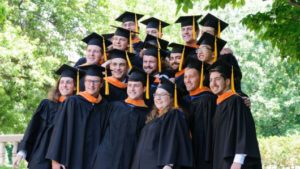
Photo Credit: Jonathan Wang, Webb Institute student, Class of 2020
Spread over 26 acres on Long Island’s North Shore, with a private beach, is a tiny but top-ranked college that offers each and every one of its students a full-tuition scholarship for all four years.
Of course, there’s a catch.
At Webb Institute — one of only nine colleges in the country that is completely tuition free — there is just one academic option: a double major in naval architecture and marine engineering.
“When you are applying to Webb, you have to love boats,” said Lauren Carballo, the admissions director.
Thanks to a hefty endowment and devoted alumni, Webb has been able to maintain free tuition even as such promises become increasingly rare. Cooper Union for the Advancement of Science and Art, for example, dialed back its commitment that education be “as free as air and water” and began offering students only half-tuition scholarships in 2014.
“We’re the only engineering school in the country that offers no tuition,” Carballo said. Still, “a lot of people don’t know we exist.”
Like winning the lottery
College applicants, however, are catching on. The number of applications is on the rise although the enrollment size remains less than 30 students per class. (Webb currently has a 27 percent acceptance rate.)
“For the right student, it’s like winning the lottery,” said Robert Franek, The Princeton Review’s editor-in-chief and author of “Colleges That Pay You Back.” Every graduate leaves school with a job in the field and an average starting salary of over $71,000, according to the school (higher than both Harvard and Yale).
Kevin Prichard, 23, graduated in June and accepted an offer at Austal, a ship building company in San Diego, working as a naval architect. He said his experience job hunting was “very easy” although his course load over four years was not. “It is a lot of work and the school pushes you.”
The college founded by the shipbuilder William Webb in 1889 is not for every engineering-minded high school student.
Although the one-two punch of skyrocketing tuition costs and sluggish wage growth has caused families to pay more attention to such pre-professional programs, particularly in STEM fields, “make sure you love the discipline,” cautioned said Eric Greenberg, president of Greenberg Educational Group, a New York-based consulting firm. “It’s going to be very focused.”
There’s more to consider beyond price
In addition, there are still room and board and other expenses to contend with, he added. “When most people hear full tuition they think there’s nothing to pay but there is a non-tuition part which can be very expensive.”
To cover those costs at Webb, Prichard took out federal loans and graduated with a student debt tab of about $30,000, he said. (Across the country, seven in 10 seniors graduate with debt, owing about $29,650 per borrower, according to the most recent data from the Institute for College Access & Success.)
“Somebody could go to community college for a lot less than the room and board at many colleges,” Greenberg added.
Greenberg recommends visiting comparable schools before making a decision based on price alone, to make sure that a specific school is the right fit.
“If someone gets in to a school like Webb and they’re not particularly interested in it, that’s not going to work out well down the road.”
Class of 2020 Recreates Famous Artwork
Each year, Professor Richard Harris’s Western Culture II class participates in an art project that requires them to recreate a painting or illustration. The goal of the project is for the student to learn to look closely at-and really see a work of art, as well as acquire a better sense of the roles of composition and color.
This year, the Class of 2020 recreated a painting or illustration from the Post-Impressionist period or later.
Upon completion, each student work of art was exhibited in the Visconti Reception Room to be viewed during graduation week, June 15-17.
View student artwork below.
Webb Institute Joins The Common Application for 2018-2019
Students applying to Webb Institute for 2018-2019 will have the ability to do so through The Common Application, a powerful online college application platform that serves and supports more than three million applicants, teachers, and counselors across the United States and around the world every year.
By becoming a Common App member, Webb will gain exposure to students who may not have otherwise considered the institution while making the application, including fee waiver, process more efficient. One-third of the more than one million Common App applicants are the first in their family to pursue a college degree.
“Webb Institute is thrilled to finally be joining the Common App for this upcoming year,” said Webb Institute’s Director of Admissions and Student Affairs, Lauren Carballo. Being available on the Common App will help to support our ongoing mission of making Webb more accessible to all students.”
In addition to providing a single, online application and 24/7/365 support for all students applying to member colleges and universities, the Common App connects applicants to financial aid and scholarship tools, digital portfolios, virtual mentors, a Virtual Counselor, and a library of resources for counselors, advisors, and recommenders working with students to complete their college applications that includes Spanish language translations.
“The diversity of our membership is one of our greatest strengths,” said Jenny Rickard, President & CEO of The Common Application. “Through membership with The Common Application, Webb Institute has demonstrated a shared commitment to pursuing access, equity, and integrity in the college admission process. Thanks to our members, all students, regardless of their background, have the opportunity to easily apply to the college or university that will help them achieve their best future.”
Students can create a Common App account now because their account will roll over from year to year. Beginning this year, Common App members will also begin using the newly introduced Common App for transfer, a separate application designed exclusively to meet the needs of transfer and adult student populations.
The Common Application is a not-for-profit member organization committed to the pursuit of access, equity, and integrity in the college admission process. Each year, more than one million students, one-third of whom are first-generation, apply to college through the Common App’s online application. Founded in 1975, the Common App serves more than 800-member colleges and universities worldwide.
Webb’s application will be available on the Common App on August 1, 2018.
To learn more, visit commonapp.org, follow @CommonApp, and #CommonApp.


